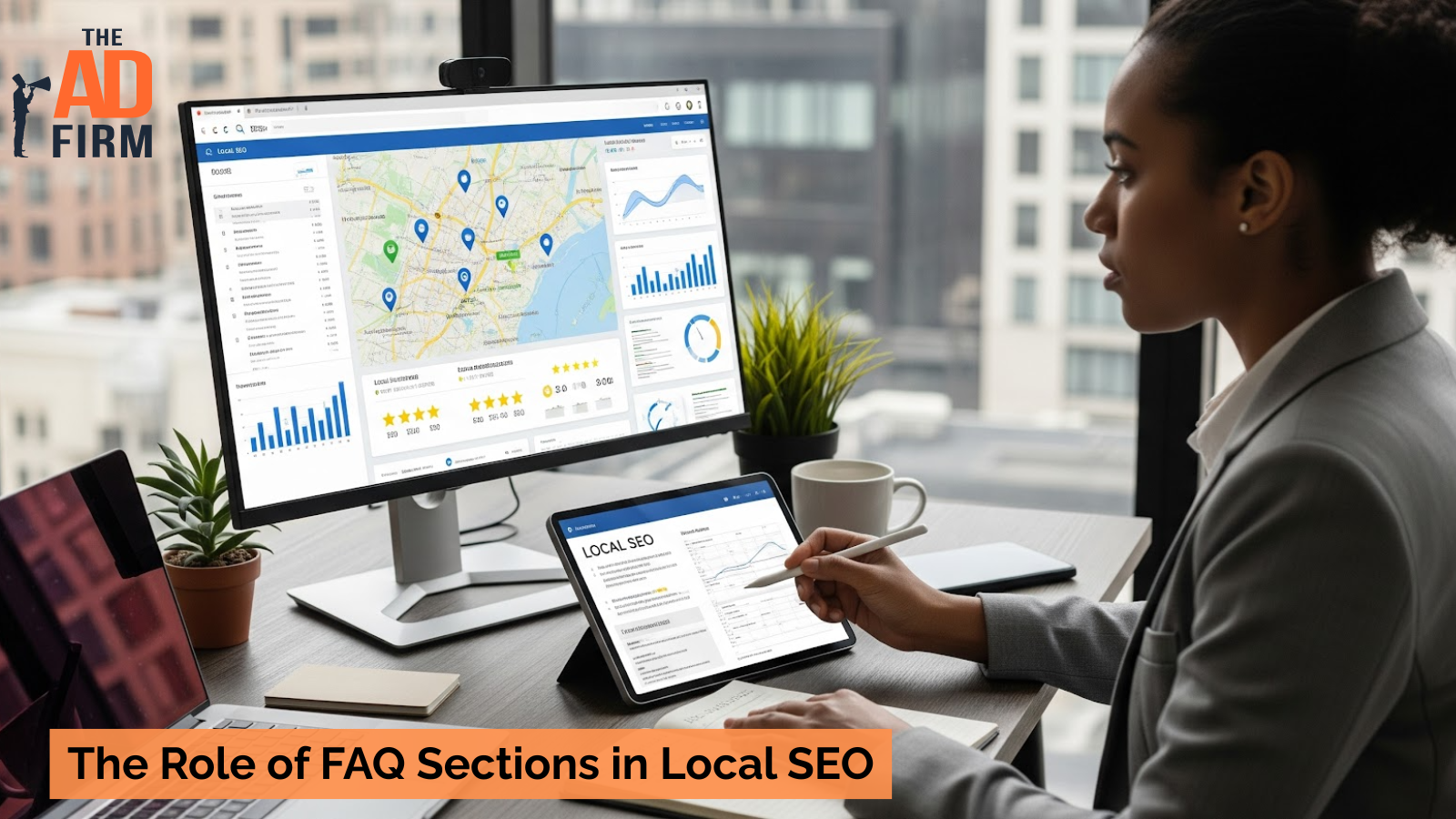FAQ sections do more than provide quick answers; they play a crucial role in enhancing your local SEO. By addressing the fundamental questions people in your community are asking, you create content that search engines can easily understand and rank. This makes your business more visible when customers search for services in your area.
For local businesses, FAQs also reduce confusion, build trust, and guide visitors toward the next step, whether that’s booking a service or visiting your store.
When paired with the right local SEO services, FAQ sections become a tool that drives both visibility and customer engagement, helping you stand out in competitive markets.
The Local SEO Benefits of a Strong FAQ Section
An FAQ section isn’t just a helpful resource for visitors; it also plays a critical role in improving your local search visibility. By answering common questions directly on your site, you create content that both customers and search engines can easily understand and interpret. This dual benefit makes FAQs one of the most practical tools for strengthening your local SEO strategy.
- Target long-tail local keywords naturally: FAQs let you answer real customer questions in plain language, which often include location-based phrases like ‘Do you deliver in [City]?’ or ‘What are your store hours near me?’ These long-tail keywords are less competitive but highly specific, making it easier for local businesses, especially those managing extensive product catalogs with ecommerce SEO, to rank effectively.
- Improve user experience and reduce bounce rates: When visitors quickly find answers to common concerns, they’re more likely to stay on your site and explore further. An FAQ section saves them from having to scroll through multiple pages to obtain simple information, such as pricing, policies, or availability. A smoother experience builds confidence in your business and reduces the chances of them leaving for a competitor. In turn, more extended visits signal to Google that your site is relevant and valuable.
- Boost voice search and snippet visibility: Many FAQs are written in the same conversational style people use when speaking to devices like Siri, Google Assistant, or Alexa. As a result, FAQ content is often incorporated into featured snippets or “People Also Ask” boxes. Appearing in these spots gives your business more visibility above traditional search results. It also positions your brand as a quick and reliable source of information.
- Build trust and authority by anticipating customer concerns: A thoughtful FAQ section shows customers that you understand their needs and are prepared to address them in advance. By answering recurring questions about services, policies, or local operations, you position your business as proactive and customer-focused. This approach demonstrates readiness rather than reaction, setting you apart from competitors who overlook these details. Over time, that consistency reinforces your reputation as a dependable resource in your industry.
- Create internal linking opportunities to key pages: Each FAQ answer can direct readers to more in-depth content, such as service pages, blog posts, or contact forms. These internal links help guide visitors to the next step while also improving site navigation. For search engines, this structure makes it easier for them to crawl and understand how your content is connected. Strong internal linking enhances both the user experience and SEO performance.
How to Build an FAQ Section That Works
Maximize Your Online Impact with The Ad Firm
- Local SEO: Capture the local market with strategic SEO techniques that drive foot traffic and online sales.
- Digital PR: Boost your brand’s image with strategic digital PR that connects and resonates with your audience.
- PPC: Implement targeted PPC campaigns that effectively convert interest into action.
A strong FAQ section doesn’t happen by accident; it requires planning and attention to what customers actually want to know.
By gathering real questions, writing clear answers, and structuring the section for SEO, businesses can create a resource that works for both people and search engines.
Finding the Right Questions
The first step is identifying what your customers genuinely want to know, not what you assume they might ask. Real-world sources, such as support tickets, reviews, and online tools, provide valuable insights into common concerns.
- Review customer service interactions: Every phone call, email, or chat log contains potential FAQ topics. If the same questions appear repeatedly, it’s a strong signal that they deserve a place on your site. This helps prevent repetitive inquiries and saves your team time. It also shows customers that you’ve anticipated their needs in advance.
- Check Google’s “People Also Ask” results: This feature displays related questions people commonly search for. By pulling ideas from there, you ensure your FAQs match real search behavior. It’s an easy way to discover topics you might have overlooked. Aligning with these searches improves your chance of appearing in those same results.
- Look at online reviews and feedback: Customers often mention what confused them or what they wanted clarified. Turning these concerns into FAQ entries addresses problems before they arise again. This proactive approach builds trust while also improving usability.
Writing Clear, Helpful Answers
Once you know the questions, the next step is crafting answers that are simple, direct, and easy to understand. Overly technical or vague answers frustrate readers and limit SEO benefits.
- Keep responses short but complete: Each answer should be long enough to fully explain but short enough to scan quickly. A few clear sentences usually work best for FAQs. This balance ensures the reader doesn’t feel overwhelmed. At the same time, it avoids leaving them with more questions.
- Write in a conversational tone: Use plain language as if you were speaking directly to a customer. Avoid jargon or industry terms that might confuse non-experts. A friendly, approachable voice helps visitors feel comfortable. It also increases the likelihood they’ll take action.
- Link to supporting pages when needed: Not every topic can be explained in just a few sentences. When a fuller explanation is required, link to a blog, service page, or resource. This makes your FAQ more useful without cluttering it with long text. It also creates a smooth path for customers to continue exploring your site.
Strengthen Your Online Authority with The Ad Firm
- SEO: Build a formidable online presence with SEO strategies designed for maximum impact.
- Web Design: Create a website that not only looks great but also performs well across all devices.
- Digital PR: Manage your online reputation and enhance visibility with strategic digital public relations.
Structuring FAQs for SEO
Even the best questions and answers won’t deliver full value if they aren’t structured correctly. Clear organization helps both readers and search engines find information efficiently.
- Organize by categories for easy scanning: Group questions under headings like “Pricing,” “Services,” or “Policies.” This helps visitors jump straight to what they need, instead of having to read through unrelated items. Logical categories also improve user experience. Search engines reward this clarity as well.
- Implement FAQ schema markup: Schema is behind-the-scenes code that tells Google your page includes FAQs. Adding it increases the chances of your answers showing up directly in search results, and a skilled digital marketing agency can ensure this is done correctly for maximum visibility.
- Ensure mobile-friendly performance: Many users check FAQs from their phones, especially when searching for local businesses on the go. A page that loads slowly or is difficult to navigate on mobile devices can frustrate customers. Optimizing for speed and responsiveness ensures the FAQ works wherever people are. This not only improves usability but also supports more substantial search rankings.
Read Also: 5 Schema Markup for More Effective Local SEO Efforts
Common Local FAQ Examples by Industry
Every industry has its own unique customer questions, and FAQ sections are most effective when they directly address those needs. By tailoring FAQs to match what real customers ask, businesses not only improve user experience but also strengthen their local SEO signals.
- Service-based businesses: Customers often want clarity on service areas, costs, and policies. A roofing company might answer “Do you service [specific suburb]?” or “What is your warranty on repairs?” Providing answers like these removes hesitation and helps customers decide faster before reaching out.
- Retailers: Common concerns include delivery, returns, and product availability. An electronics shop could include questions such as “Do you deliver within [city]?” or “What is your return policy for defective items?” Addressing these questions improves decision-making and speeds up the path from interest to purchase.
- Restaurants: Food-related businesses can anticipate questions about catering, reservations, and dietary needs. A local café could include “Do you serve vegan options?” or “How do I book a large party table?” These FAQs simplify planning and reduce friction, allowing customers to make reservations or orders with confidence.
- Healthcare providers: Clinics or dental offices may receive recurring questions about insurance, appointment scheduling, or services offered. For example, “Do you accept [insurance provider]?” or “Can I book same-day appointments?” Including these ensures patients know precisely what to expect, reducing missed appointments and last-minute cancellations.
- Gyms and fitness studios: People often inquire about membership options, trial classes, and available amenities. An FAQ might include questions such as “Do you offer free trials?” or “Is there parking available at your [city] location?” Addressing these details upfront can make it easier for new members to commit, and working with an experienced SEO company ensures these FAQs are optimized to capture more local searches.
Tracking the Performance of Your FAQ Section
Building an FAQ section is only the first step; you also need to measure its effectiveness. By monitoring user engagement and SEO results, you can determine if your FAQs are effectively addressing customer needs and enhancing local visibility.
Enhance Your Brand Visibility with The Ad Firm
- SEO: Enhance your online presence with our advanced SEO tactics designed for long-term success.
- Content Marketing: Tell your brand’s story through compelling content that engages and retains customers.
- Web Design: Design visually appealing and user-friendly websites that stand out in your industry.
- Track search impressions and clicks: Google Search Console shows how often your FAQ pages appear in search results and how many people click through to them. These insights reveal which questions resonate most with searchers and where you may need to refine answers for stronger visibility.
- Measure on-page engagement: Tools like Google Analytics or heatmaps can show how far visitors scroll, which FAQs they click to expand, and how long they stay on the page. High engagement signals your content is useful, while drop-offs indicate areas that need more precise or more relevant answers.
- Check the impact on conversions: A strong FAQ page should not only inform but also guide users toward a desired action. Track whether visitors who interact with FAQs are more likely to make a call, complete a form, or make a purchase. This connects your FAQ strategy directly to business results.
- Evaluate voice search and snippet wins: Many FAQs get pulled into featured snippets or voice results. Monitoring these placements helps you understand which answers are performing well in conversational searches, providing a roadmap for adding similar content.
- Refine regularly with data: Use analytics reports to update or expand questions as customer needs evolve. Seasonal changes, new products, or local events can all spark fresh queries worth adding. Continuous refinement keeps your FAQ page relevant and ensures it remains a valuable SEO asset.
Ready to Turn Your FAQs Into Traffic Drivers?
FAQ sections can do more than answer questions; they can boost your visibility, reduce support load, and build trust with your local audience.
At The Ad Firm, we specialize in helping businesses design effective FAQ strategies through local SEO services, content planning, and on-page optimization.
Whether you need help selecting the most effective questions for your audience, writing clear answers, or implementing FAQ schema markup, our team can guide you from idea to results.
Contact The Ad Firm today, and let’s transform your FAQs into a tool that drives leads, enhances customer experience, and strengthens your local search presence.





